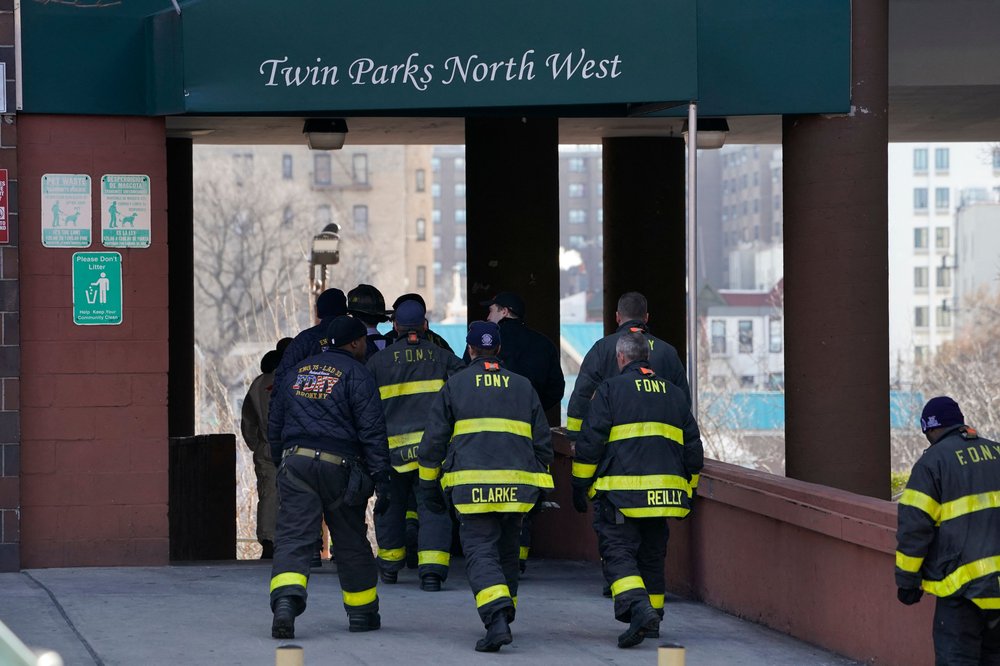NYC steps up self-closing door violations after Twin Parks fire, but 30K remain unresolved
Feb. 1, 2024, 12:32 p.m.
Alleged violations are up nearly 40% since 2022, when the deadly Bronx blaze killed 17 people, including eight children.

City housing inspectors are issuing more violations than ever for faulty apartment doors that are supposed to automatically shut to prevent fires from spreading, but thousands still remain unresolved, newly released city data shows.
A report on agency performance released on Tuesday shows that inspectors from the Department of Housing Preservation and Development issued roughly 22,300 violations for doors that didn’t close on their own between July and October 2023, the first four months of the current fiscal year. That's nearly 40% more than in the same period in 2022 and part of an overall increase in violations issued for self-closing doors and other “immediately hazardous” conditions, including heat outages.
The spike in self-closing door violations issued to building owners comes two years after a deadly fire in the Bronx killed 17 people, including eight children.
Multiple doors to an apartment and stairwells failed to shut at the Twin Parks North West high-rise in Fordham Heights in January 2022, allowing smoke from a fire sparked by a space heater on the second story to spread throughout the building. The blaze sparked new laws penalizing landlords who fail to promptly fix doors that don’t shut and latch on their own, as well as additional funding to hire and train HPD inspectors.
But HPD data shows that nearly 30,000 violations issued since the Twin Parks fire are still marked “open” and unresolved despite the increase in alleged violations. Owners have corrected and “closed” another nearly 65,000 door violations in that period, according to the data.
Under a law passed in the wake of the 2022 fire, owners must correct self-closing door violations within 14 days or face daily fines of $250 until the doors are fixed. HPD must then revisit the building within 20 days to reinspect the doors.
Department spokesperson William Fowler said HPD is attempting to inspect every self-closing door violation to determine whether they have been corrected.
He said the agency has also trained more than 350 staff members to inspect self-closing doors since the Twin Parks fire and closed 77% of violations during the 2023 fiscal year.
But City Councilmember Oswald Feliz, who represents the district that includes the Twin Parks complex and introduced the stricter inspection legislation, said staff shortages at HPD threaten to undermine the law, even as the agency seems to be prioritizing enforcement.
“We’ve made progress, but more must be done to ensure every non-working self-closing door is timely reinspected and corrected,” Feliz said. “This will save lives and prevent tragedies."
Sateesh Nori, a housing attorney and adjunct professor at NYU's law school, said the number of outstanding violations shows “a gap between enforcement and compliance.”
“They need to close the circuit,” Nori said. “They’re identifying the problem, but any one of [the violations] could be the next Twin Parks.”
The Twin Parks fire was the city’s deadliest blaze since the Happy Land nightclub fire in 1990, and spread through open doorways into the 19-story building's highest floors.
The fire injured dozens, displaced hundreds more and killed 17 people — including nearly every member of one family. The complex was home to many working-class immigrant families from across West Africa and Latin America, and most victims were of Gambian descent.
Self-closing door tests are now a routine part of HPD inspections.
Inspectors who arrive at buildings to check on heat outages, pest infestations and other complaints also test each door they pass through to see if they close on their own. This has led to the rise in recorded violations and increases in emergency repair work, according to HPD.
Frank Ricci, vice president of the Rent Stabilization Association, a landlord trade group, said tenants bear some responsibility for safety risks if they tinker with doors to keep them open in buildings' common areas, such as hallways or stairwells. Ricci also noted the HPD data doesn’t account for corrected violations that the agency never certified or recorded as having been updated.
“We don’t want to see anyone hurt or anyone perish in a fire and self-closing doors are a necessary part of that,” he said.
But other experts say the city should be doing far more to ensure apartment building doors are safe and able to withstand a fire's extreme temperatures.
Fire door inspector Jacob Wexler, whose company Legacy Manufacturing produces door parts, criticized the current inspection system as a “gimmick” meant to give the appearance of meaningful intervention.
Wexler said building doors should meet strict requirements to ensure they can withstand high heat and that gaps around doorways are minimal.
“Let’s start making this city a little safer,” he said.
One year after deadly Twin Parks fire in the Bronx, tenants move away and enforcement lags Adams’ NYC budget plan funds crackdown on 15,000 self-closing door violations "It Cannot Be Imagined" — A Close Community Begins To Grieve After Bronx Fire